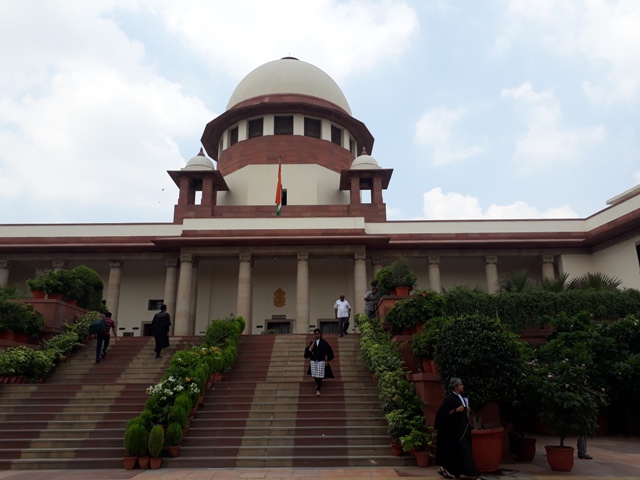SC miffed over 78 adjournments by Dehradun court, orders completion of trial in 6 months
Miffed over 78 adjournments granted by a lower court in Dehradun, the Supreme Court has directed it to complete the trial within six months in a 2014 case of cheating and forgery against three persons.Noting that the trial court has not moved an inch despite having taken cognisance of case almost seven years back, a bench headed by Justice A M Khanwilkar directed the Investigating Officer to ensure that the witnesses are made available on the scheduled dates for being examined by the trial court.

- Country:
- India
Miffed over 78 adjournments granted by a lower court in Dehradun, the Supreme Court has directed it to complete the trial within six months in a 2014 case of cheating and forgery against three persons.
Noting that the trial court has not moved an inch despite having taken cognizance of the case almost seven years back, a bench headed by Justice A M Khanwilkar directed the Investigating Officer to ensure that the witnesses are made available on the scheduled dates for being examined by the trial court. ''We direct the trial court to ensure that the trial is concluded not later than six months from the date of receipt of the copy of this order. ''We are required to issue this direction as we have noticed that the trial court, despite having taken cognizance almost seven years back, has not moved in the matter even an inch thereafter, including to frame charges, as may be necessary, despite 78 adjournments in the case,'' the bench, also comprising Justices Dinesh Maheshwari and CT Ravikumar, said.
The bench also enlarged the accused -- Manish Verma, Sanjeev Verma, and Neetu Verma -- on bail on terms and conditions which were imposed by the trial court and directed them to extend full cooperation in the case for early disposal of the matter.
''In case, the trial court believes that the private respondents are not cooperating in the progress of the trial or are taking unnecessary adjournments, it must record that opinion in the roznamcha (diary) and if that is a persistent approach of the private respondents, it will be open to the trial court to consider cancellation of bail following the law,'' the bench said.
Needless to observe that the order of cancellation of bail of the private respondents will not come in their way and the trial must proceed on its own merits and following law, it said.
The apex court's order, dated September 15, came on an appeal filed by Dr. Atul Krishna against the Uttarakhand High Court order dismissing his plea seeking early disposal of the case.
As per the appeal, an FIR was registered in 2012 by the petitioner at police station Jaani in Meerut district against the respondents for the commission of an offense under section 420 (cheating), 406 (Punishment for criminal breach of trust), 467 (Forgery of valuable security, will), 468 and 470 ( Forged document or electronic record) of the Indian Penal Code at Meerut concerning a land deal.
Subsequently, because the major properties and documents, which were the subject matter of the complaint in the said FIR are and all the documents about the commission of the said offense, since were falling within the domain of district Dehradun, the matter was transferred there.
The appeal filed through advocate Vivek Singh submitted that a perusal of the order sheet of the trial court from June 28, 2014, to October 15, 2020, will show that from the date of taking cognizance that is June 28, 2014, as many as 78 dates had been fixed by it for hearing of the said case till October 15, 2020, but even the charges have not been framed against the respondents in these years.
''The High Court gravely erred in holding that the writ petition of 2020 for the relief of time-bound dispose of it the trial case cannot be invoked as the petitioner earlier in 2015 had approached the High Court for the same relief and it had requested the trial court in 2015 to endeavor to decide the case as early as possible,'' the plea said.
The appeal contended that the private respondents had deliberately abused the process of law by taking adjournments on one ground or the other and had been successful in protecting the criminal proceedings.
''It is beyond imagination that despite the passing of more than six years from the date of filing of charge sheet and taking of cognizance, even the charges could not be framed till date. ''It is submitted that the conduct of respondents is apparent from the fact that they initially do not appear before the trial court till the time bail was granted and after securing bail the respondents kept in finding exemption application on one pretext or the other to delay the trial of the criminal case,'' the appeal stated.
(This story has not been edited by Devdiscourse staff and is auto-generated from a syndicated feed.)
ALSO READ
Modi congratulates Simon Harris on being appointed as Ireland's youngest Prime Minister
"Looking forward to work together": PM Modi congratulates Simon Harris on becoming Ireland's youngest PM
Arvind Kejriwal's non-cooperation with ED is visible: Delhi High Court
Calcutta High Court orders CBI investigation into allegations of crimes against women and land grabbing in Sandeshkhali
Calcutta High Court directs CBI to investigate allegations of crimes against women and land grabbing in Sandeshkhali










